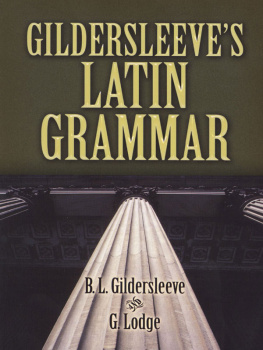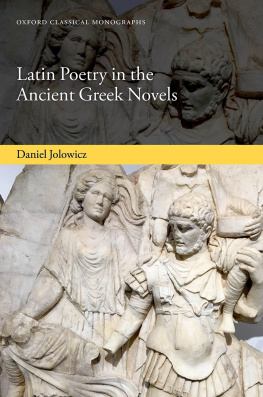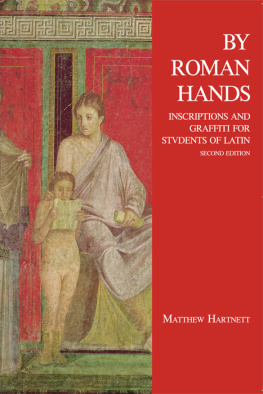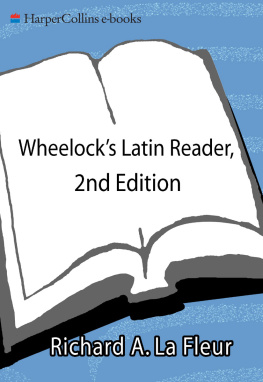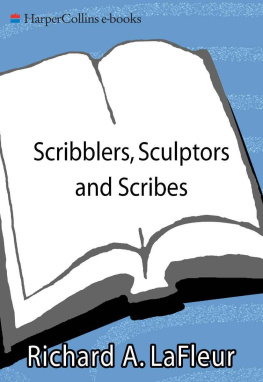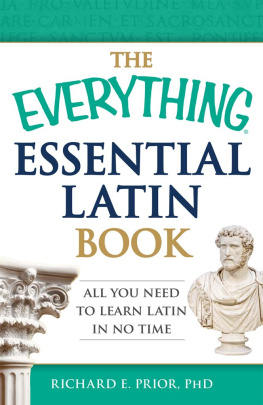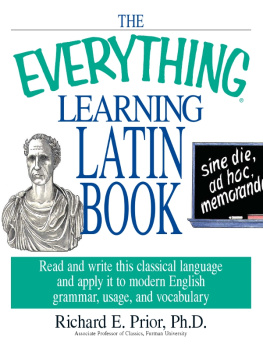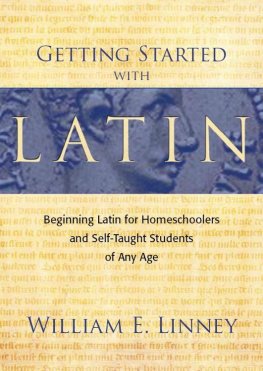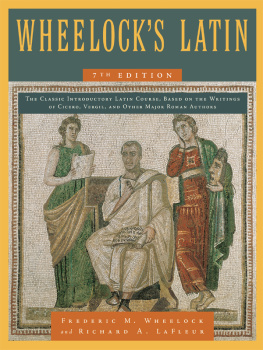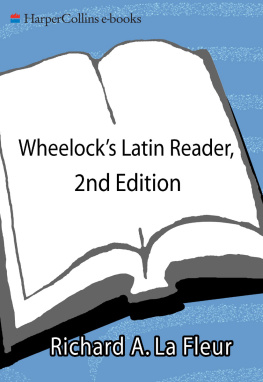Wheelock Frederic M. - Wheelocks Latin
Here you can read online Wheelock Frederic M. - Wheelocks Latin full text of the book (entire story) in english for free. Download pdf and epub, get meaning, cover and reviews about this ebook. City: New York;Rome;Rome (Empire, year: 2005, publisher: HarperCollins;HarperResource, genre: Home and family. Description of the work, (preface) as well as reviews are available. Best literature library LitArk.com created for fans of good reading and offers a wide selection of genres:
Romance novel
Science fiction
Adventure
Detective
Science
History
Home and family
Prose
Art
Politics
Computer
Non-fiction
Religion
Business
Children
Humor
Choose a favorite category and find really read worthwhile books. Enjoy immersion in the world of imagination, feel the emotions of the characters or learn something new for yourself, make an fascinating discovery.

- Book:Wheelocks Latin
- Author:
- Publisher:HarperCollins;HarperResource
- Genre:
- Year:2005
- City:New York;Rome;Rome (Empire
- Rating:5 / 5
- Favourites:Add to favourites
- Your mark:
- 100
- 1
- 2
- 3
- 4
- 5
Wheelocks Latin: summary, description and annotation
We offer to read an annotation, description, summary or preface (depends on what the author of the book "Wheelocks Latin" wrote himself). If you haven't found the necessary information about the book — write in the comments, we will try to find it.
Wheelocks Latin — read online for free the complete book (whole text) full work
Below is the text of the book, divided by pages. System saving the place of the last page read, allows you to conveniently read the book "Wheelocks Latin" online for free, without having to search again every time where you left off. Put a bookmark, and you can go to the page where you finished reading at any time.
Font size:
Interval:
Bookmark:
Wheelocks Latin
Frederic M. Wheelock
Revised by
Richard A. LaFleur
6th Edition, Revised

The genesis of, and inspiration for, Wheelocks Latin was the 1946 G.I. Education bill which granted World War II Veterans a college education upon their return from service. Why would a vet, schooled on the battlefields of Europe and Asia, want to study Latin? asked our father, then a Professor of Classics at Brooklyn College. What could this language say to those who had already seen so much reality? How could a teacher make a dead language become alive, pertinent, and viable? How could one teach Latin, not as an extinct vehicle, but as the reflection of a lively culture and philosophy? This was the challenge our father undertook.
Frederic Wheelock set about to create a Latin text that would give students something to think about, a humanistic diet to nurture them both linguistically and philosophically. The book began with lessons he designed especially for his Brooklyn College students. As children we smelled regularly the pungent hectograph ink which allowed him to painstakingly reproduce the chapters of a book he was designing, page by page on a gelatin pad, for one student at a time. In 1950, on Frederics six-month sabbatical leave, the Wheelock family travelled to the remote village of San Miguel De Allende in Mexico, where Frederic conscientiously wrote his text, and our diligent mother, Dorothy, meticulously typed the manuscript on an old portable typewriter. We young children scampered irreverently underfoot or played with native children and burros.
Twelve years of refinement, revision, and actual usage in our fathers classrooms resulted in the books first edition. When students needed to learn grammar, they read lessons and literature from the great ancient writers who used the grammar in a meaningful context. Our father sought to graft the vital flesh and blood of Roman experience and thinking onto the basic bones of forms, syntax, and vocabulary; he wanted students to transcend mere gerund grinding by giving them literary and philosophical substance on which to sharpen their teeth.
As early as we can remember classical heritage filled our house. The etymology of a word would trigger lengthy discussion, often tedious for us as adolescents but abiding as we became adults. Knowing Latin teaches us English, we were constantly reminded; 60% of English words are derived from Latin. Students who take Latin are more proficient and earn higher scores on the verbal SAT exam. The business world has long recognized the importance of a rich vocabulary and rates it high as evidence of executive potential and success. Understanding the etymological history of a word gives the user vividness, color, punch, and precision. It also seems that the clearer and more numerous our verbal images, the greater our intellectual power. Wheelocks Latin is profuse with the etymological study of English and vocabulary enrichment. Our own experiences have shown that students will not only remember vocabulary words longer and better when they understand their etymologies, but also will use them with a sharper sense of meaning and nuance.
Why, then, exercise ourselves in the actual translation of Latin? Inexorably accurate translation from Latin provides a training in observation, analysis, judgment, evaluation, and a sense of linguistic form, clarity, and beauty which is excellent training in the shaping of ones own English expression, asserted Frederic Wheelock. There is a discipline and an accuracy learned in the translation process which is transferable to any thinking and reasoning process, such as that employed by mathematicians. In fact, our fathers beloved editor at Barnes & Noble, Dr. Gladys Walterhouse, was the Math Editor there and yet an ardent appreciator of Latin and its precision.
Our father loved the humanistic tradition of the classical writers and thinkers. And he shared this love not only with his students through the Sententiae Antquae sections of his Latin text, but also with his family and friends in his daily life. As young girls, we were peppered with phrases of philosophical power from the ancients, and our father would show how these truths and lessons were alive and valid today. Some of the philosophical jewels which students of Latin will find in this book are: carpe diem, seize the day; aurea mediocrits, the golden mean; summum bonum, the Highest Good; and the derivation of morality from mrs (good habits create good character, as our father used to tell us).
If learning the Latin language and the translation process are important, then getting to know the messages and art of Horace, Ovid, Virgil, and other Roman writers is equally important. Wheelock presents these Classical authors writings on such illuminating topics as living for the future, attaining excellence, aging, and friendship. The summum bonum of Latin studies, Frederic Wheelock wrote, is the reading, analysis and appreciation of genuine ancient literary humanistic Latin in which our civilization is so deeply rooted and which has much to say to us in our 20th century.
For the 45 years that Frederic Wheelock was a Professor of Latin, he instilled in his students the love of Latin as both language and literature, and he did so with humor and humility. He dearly loved teaching, because he was so enthusiastic about what he taught. He had a deep and abiding respect for his students and demanded discipline and high standards. He wished for Latin to be loved and learned as he lived it, as a torch passed down through the ages, to help light our way today.
In 1987, as Frederic Wheelock was dying at the end of 85 richly lived years, he recited Homer, Horace, and Emily Dickinson. He, like the ancients, leaves a legacy of the love of learning and a belief that we stand on the shoulders of the ancients. He would be delighted to know that there are still active and eager students participating in the excitement and enjoyment of his beloved Latin.
Martha Wheelock and Deborah Wheelock Taylor
Fliae amantissimae
Why a new beginners Latin book when so many are already available? The question may rightly be asked, and a justification is in order.
It is notorious that every year increasing numbers of students enter college without Latin; and consequently they have to begin the language in college, usually as an elective, if they are to have any Latin at all. Though some college beginners do manage to continue their study of Latin for two or three years, a surprising number have to be satisfied with only one year of the subject. Among these, three groups predominate: Romance language majors, English majors, and students who have been convinced of the cultural and the practical value of even a little Latin. Into the hands of such mature students (and many of them are actually Juniors and Seniors!) it is a pity and a lost opportunity to put textbooks which in pace and in thought are graded to high-school beginners. On the other hand, in the classical spirit of moderation, we should avoid the opposite extreme of a beginners book so advanced and so severe that it is likely to break the spirit of even mature students in its attempt to cover practically everything in Latin.
Accordingly, the writer has striven to produce a beginners book which is mature, humanistic, challenging, and instructive, and which, at the same time, is reasonable in its demands. Certainly it is not claimed that Latin can be made easy and effortless. However, the writers experience with these chapters in mimeographed form over a number of years shows that Latin can be made interesting despite its difficulty; it can give pleasure and profit even to the first-year student and to the student who takes only one year; it can be so presented as to afford a sense of progress and literary accomplishment more nearly commensurate with that achieved, for instance, by the student of Romance languages. The goal, then, has been a book which provides both the roots and at least some literary fruits of a sound Latin experience for those who will have only one year of Latin in their entire educational career, and a book which at the same time provides adequate introduction and encouragement for those who plan to continue their studies in the field. The distinctive methods and devices employed in this book in order to attain this goal are here listed with commentary.
Next pageFont size:
Interval:
Bookmark:
Similar books «Wheelocks Latin»
Look at similar books to Wheelocks Latin. We have selected literature similar in name and meaning in the hope of providing readers with more options to find new, interesting, not yet read works.
Discussion, reviews of the book Wheelocks Latin and just readers' own opinions. Leave your comments, write what you think about the work, its meaning or the main characters. Specify what exactly you liked and what you didn't like, and why you think so.

